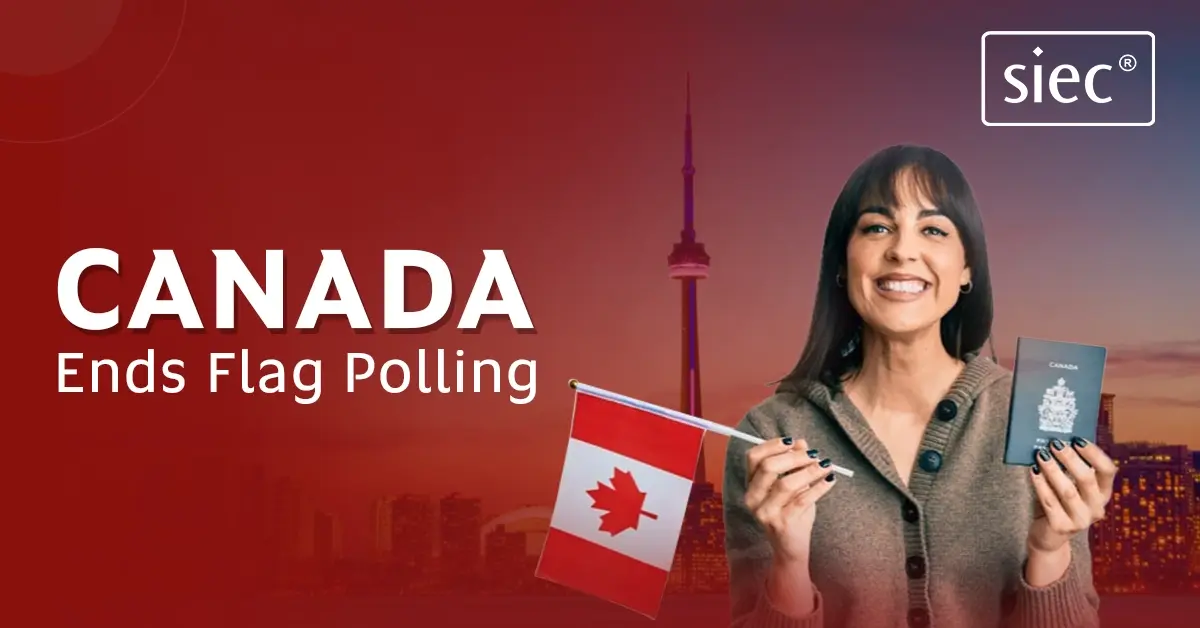
Updated On: 07 October 2025
Canada Ends Flag Polling for Border Applications on Post-Grad Work Permits
In a noteworthy change of policy, the Government of Canada has announced the cessation of flag polling for border applications on post-graduate work permits. This decision affects hundreds of thousands of foreign graduates as it was a common practice among them to resort to this method to obtain a work permit faster. In this blog we will delve about Canada Ends Flag Polling for Border Applications on Post-Grad Work Permits.
Read More: Study in Canada: Cost, Courses & Scope
Canada Ends Flag Polling: What is Flag Polling?
‘Flag Polling’ is the activity whereby international students and other visa applicants have to leave Canada for a short period of time, usually to the border of U.S.A, and return with a view to changing or extending visas or work permits. Flag poling is primarily common among international students who have graduated and want to undertake post-graduate work offered in such countries since it is considered faster than the conventional mail out systems.
Canada Ends Flag Polling: Disadvantages
In a landmark directive from the federal government aimed at immigration applications, Canadians have been told that flag polling where the audience visa targets is to obtain post graduate work permits PGWPs practice is over. This technique that used to be favoured by foreign students and such visa applicants became less appealing for a variety of causes which sped the implementation of this policy.
Disadvantages of Flag Polling
- Border bottlenecks:
The act of flag polling has resulted in most border crossings being congested with delays and an increase in the number of duties for border officers. This delay affects the normal course of border operations and often results in prolonged periods of waiting for movement for both travellers and applicants.
- Inconsistent Processing:
The end results of flag-polling are dependent on a certain border officer, location, or even both. This lack of uniformity poses a challenge to most applicants as they will be subjected to varying application of the same set of operational policies leading to chances of rejection or unnecessary probing.
- Security Issues:
The frequent exiting from and entering to the borders raises security problems. It is difficult to keep track of each and every one’s purpose and more so the applicants so as to prevent security from being compromised.
- Economical and Logistical Problems:
An applicant flag poll in most cases will incur more travel costs and inconveniences like logistical arrangements such as transport and staying from school or work for several days. Seeking to overcome such hurdles can be expensive and inappropriate.
- Limitations of U.S Border Policies:
A very important aspect of flag polling is the support of U.S. border authorities. The applicants’ ability to practice flag polling may, therefore, change unpredictably every time there are new transformations in the policies regarding the management of borders in the U.S.
Read this also: Top 5 Steps to Study in Canada
Canada Ends Flag Polling: Policy Change
The decision of the Canadian government to stop flag polling is motivated by the reasons mentioned above. The Canada Border Services Agency (CBSA) and Immigration, Refugees and Citizenship Canada (IRCC) have taken steps to ensure that the post-graduate work permit application process is efficient by making all post-graduate work permit applications to be done over the internet.
Post-graduate work permit applications will no longer be accepted for processing by the Canada Border Services Agency (CBSA) at any land border crossings as per the new directive issued Effective immediately. Therefore, all applications for PGWPs whether within the country, Canada or outside, can only be made via the online IRCC portal operated by Immigration, Refugees and Citizenship Canada.
This is expected to facilitate the application processes, to limit the traffic at the national borders and to reduce unnecessary travel for security reasons. As stated by the CBSA and the IRCC, it is the government's mandate to address this issue as a part of the whole renovation of the immigration system in Canada that aims at reducing the processing timelines for the applicants.
Expected Benefits of Ending Flag Polling
- Improved Efficiency:
The government intends to simplify the application process by moving it online, thus, resolving discrepancies as well as improving processing speeds for a more certain and dependable system for applicants.
- Security Enhancement:
The removal of unnecessary locations to be crossed enhances the country's security, as border security personnel are left to deal with only the essential duties.
- Less Congestion:
In an effort to ease the clogging at the border points, the practice of flag polling will be removed, thus enhancing the travel experience for everyone crossing the border.
- Time & Cost:
There will be no extra traveling costs or organizational issues related to flag polling due to the simplified process, costing making it quicker and cheaper for the applicants.
Read this also: Jobs after MS in Canada
Community and Stakeholder Reactions on the End of Flag Polling
The international student population and immigration experts have expressed different opinions on the conclusion of flag polls. In as much as there are those who welcome this idea in view of fast and safe processes, others are worried about the possible delays brought about by the change.
Educational institutions and student organizations are expected to provide the necessary support to the international students in this transformation. Availability of appropriate communication and educational materials will be pivotal in this process.
Canada Ends Flag Polling: Impact on International Graduates
The end of flag polling for PGWPs marks a significant shift for international graduates. Many relied on this method to quickly transition from student status to work status without prolonged waiting periods. While the online application process is designed to be more efficient, there may be a period of adjustment as applicants adapt to the new system.
International students are encouraged to familiarize themselves with the updated application procedures and timelines. The IRCC has assured applicants that comprehensive resources and support will be available to assist with the transition.
Canada Ends Flag Polling: Community Response
The implication of this development is quite large for international students who wish to apply for PGWP since flag polling is now discontinued. They should not rely on the same to avoid the delays associated with a change in status.
Although the online application procedure is meant to be more user-friendly, there will be teething issues as applicants get used to the restructuring. International students are advised to read on the new application procedures and timelines. The IRCC has filed reassurances to the applicants concerning the provision of extensive materials and assistance in the adaptation process.
Canada Ends Flag Polling: Looking Ahead
In the quest of the Great White North to lure more and more international labor, the position of the authorities towards the adjustments of immigration processes is of high importance. It is worth noting that the prohibition of flag polling is a turning point, and it is also indicative of the changing immigration policies in light of the changing issues and prospects.
International students, graduates and prospective ones should keep track of the further news and use the means-to-an-end as possible to be able to cope with the new application process. The transition may present initial challenges, but it also offers a pathway to a more streamlined and secure process for obtaining post-graduate work permits in Canada.
You may like: Bow Valley College, Canada
Conclusion
The pressing need for Canada to end flag polling in the application for a post graduate work permit is indicative of a major change in the countries immigration policies. Flag polling might have provided a quick and at times an advantageous way of acquiring working permits, however, allowed numerous drawbacks, ranging from border traffic to security issues which necessitated the change. The shift in focusing towards a centralized, online application has dealt with the above challenges and it is expected to enhance the overall immigration system making it easier, safer and more efficient.
Reach out to SIEC for Application inquiries and assistance.
Read more insightful articles:
Guide to Studying in Canada as an International Student
Low Cost MBA Colleges in Canada
How can SIEC help Students Study, Work, and Immigrate in Canada?



Comments (0)
Leave a Comment